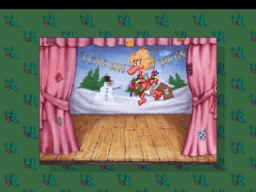Christmas Card 1990: The Seasoned Professional
| Christmas Card 1990: The Seasoned Professional | ||
|---|---|---|

| ||
| First release | 1990 | |
| Also known as | Xmas Card 1990, The Seasoned Professional | |
| Developed by | Sierra | |
| Published by | Sierra | |
| Distributed by | Sierra | |
| Platforms | MS-DOS, Tandy 1000 | |
| Resolution | 320x240 16 colors or 256 colors | |
| Engine | SCI | |
| Support | Since ScummVM 1.2.0 | |
| Available for Purchase |
Available from our demos page | |
Christmas Card 1990: The Seasoned Professional is the name to which Sierra's third Christmas Card program is most commonly referred. Like the previous cards, it was distributed to stores by Sierra and was intended to showcase the color and sound capabilities of the computer for sale, and to showcase Sierra's game engine. This time it was meant to showcase the 256 color capability of the SCI engine in VGA mode, although a 16 color EGA version was also available.
It is a humourous program that depicts a stage audition for Christmas characters, but characters from other holidays keep showing up instead, resulting in the off-screen director to keep yelling CUT! Hopefully, the right character for the Christmas play will show up to the audition before the credits roll.
Installation
Required data files
For more information on how ScummVM uses game data files, see the user documentation.
WARNING: Unlike other games, SCI games have significant variation in the naming of required files.
They also can load supplementary files by resource maps, so it is recommended to keep all files in the game data directory from the CD.
Unless otherwise specified, do NOT remove any file from the directory, even if it does not appear on the following list, since this will likely cause weird bugs.
Copy all files to the game directory. Some games need additional work:
Floppy games with RESOURCE.p01, p02, etc. and/or RESOURCE.a01, a02, etc. files
- Concatenate all RESOURCE.p0* files to RESOURCE.000 (e.g.
copy /b RESOURCE.p0* RESOURCE.000on Windows, orcat RESOURCE.p0* > RESOURCE.000on *nix). - Concatenate all RESOURCE.a0* files to RESOURCE.AUD (e.g.
copy /b RESOURCE.a0* RESOURCE.AUDon Windows, orcat RESOURCE.a0* > RESOURCE.AUDon *nix).